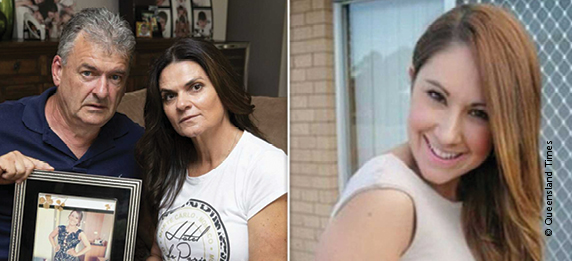We met in a teenage chat room, he had been 50 years old and was on [the site] all the time. I know he was talking to other girls, so I don’t believe I was the only one this happened to. If the police had said they could prosecute, I would have done it.
Victims of online deception are often left heartbroken, bankrupt, destitute or even suicidal. While some predators face charges for fraud or extortion, many who commit these irreparable harms will never face any consequences. Is it time to criminalise catfishing?
Warning: This article contains content that may be distressing for some readers. If this article raises issues for you or someone you know, Lifeline for Lawyers offers 24-hour support on 1800 085 062.
Heartbroken and alone, Renae Marsden was just 20 years old when she sent her mother a loving text message and ended her life. It is unlikely she ever knew the horrifying truth of the man she loved; that he was a sickening work of fiction, concocted by a former friend.
Susannah Birch was 15 years old when she met 17-year-old Richard in an internet chat room. Their banter soon blossomed into a 12-year online romantic, then platonic, relationship.
“I always suspected something wasn’t right,” she tells LSJ.
“But I didn’t think it was a big deal. I thought it was something like he still lives with his parents, or he isn’t going to university and is on the dole or something like that he was embarrassed about.”
This was during the early 2000s – the pre-Facebook era – when Susannah says “it wasn’t unusual at that time to not have an online presence”. Still, her unease at Richard’s mysteriousness, his excuses to never meet up in person, and evasiveness lingered, and she considered hiring a private detective to reveal the truth.
It was not until she watched the American documentary Catfish in 2014 that she felt she had discovered the depth of Richard’s deception. Using an online platform that assists people with verifying online identities, she learned the truth. The man she knew as Richard was in fact a 62-year-old former police officer-turned-university lecturer, who had been using old family photos of his son to create a virtual persona.
“I felt relief, as I understood that for all these years when he would make an excuse as to why he couldn’t meet me, it hadn’t been my fault or a reason to do with me,” Susannah says.
“I also felt like I was regaining control and power over the situation. When we had been in a relationship, he had the power. If I didn’t respond to his messages quickly enough or didn’t send a photo that he’d ask me to, he would block me or stop talking to me.”
 Susannah Birch
Susannah Birch
Susannah confronted Richard, and it was only when presented with proof that she had the phone number for his direct line at the university that his lies unravelled. But the manipulation continued, as he warned Susannah that his family would be destroyed and he would commit suicide if she exposed him.
“I did go to the police and they said there was no way they could prosecute,” she says.
Her case exposed the gaps in current laws that apply to catfishing. Richard had made no material gain from their relationship, and the photos Susannah sent him when she was underage had been exchanged over extinguished online platforms, chat rooms and old email addresses that no longer existed.
“Some parts of me definitely wanted to pursue him criminally,” she says.
“We met in a teenage chat room, he had been 50 years old and was on [the site] all the time. I know he was talking to other girls, so I don’t believe I was the only one this happened to. If the police had said they could prosecute, I would have done it.”

Fatal deception
The anonymity of web entanglements offers plenty of opportunity to deceive. But as recent Australian cases have shown, catfishing traverses far beyond internet pranks. Like in Renae Marsden’s case, the consequences can be fatal.
Renae took her own life at The Gap in Sydney’s east in August 2013 – the same day as the break-up of her relationship with a man she knew as Brayden. The relationship, conducted through text messages, had been intense. Brayden, however, was found to be a fake account set up by Renae’s former best friend Camila Zeidan.
Deputy State Coroner Elaine Truscott found Brayden was created by Zeidan so she could maintain an intimate relationship with Renae. Zeidan received immunity from prosecution in exchange for giving evidence at the inquest, although presently there is no offence in the Crimes Act (NSW) that likely would have applied to her case.
“If Renae discovered that her relationship with Brayden was but a fiction and she took her own life as a consequence, the community might consider that catfishing is an act which should be prohibited,” Magistrate Truscott said in her findings, handed down on 20 May.
Renae’s family spent years campaigning for an inquest into her death and, following the evidence of the taunting that horrified their daughter and sister in her final days, called for a standalone criminal offence of catfishing to be introduced.
How can anybody put somebody else through mental torture on a grand scale and come out of it on the other end and not be accountable to the law?
Mark Marsden, Renae’s father
Renae’s father Mark Marsden said following the inquest into Renae’s death: “How can anybody put somebody else through mental torture on a grand scale and come out of it on the other end and not be accountable to the law?”
In Victoria in 2019, Lydia Abdelmalik was sentenced to a minimum of one year and nine months in jail after posing online as Home and Away actor Lincoln Lewis, tricking young women into believing they were beginning a romantic relationship with him and then threatening them.
Magistrate Stephen Ballak, in sentencing her for six charges of stalking, described her behaviour as “calculated and cruel”.
One of the women who was stalked by Abdelmalik later committed suicide, having developed post-traumatic stress disorder, depression and anxiety in the aftermath of the offence. Prior to her death, the young woman had prepared a victim impact statement describing the impact of the deceit.
“Anger and distrust followed me wherever I ventured,” she wrote.
The term catfishing was coined after the title of the same documentary Susannah watched, which revealed how a woman used Facebook to craft a fake identity and initiate a romantic relationship with an unsuspecting man.
The term references the luring involved in catfishing in the American South, when a person plunges their arm into darkness in order to entice the fish to latch onto it.

The lure of the law
Catfishing can be covered by s13 of the Crimes Personal and Domestic Violence Act (NSW) relating to stalking and intimidation, or s192(e) of the Crimes Act (NSW) regarding obtaining financial benefit by deception.
Magistrate Truscott noted in the Renae Marsden findings that “where ‘catfishing’ is without threat or intimidation or is not for monetary gain, then the conduct appears to be committed with the intent to coerce and control someone for the purpose of a wish fulfilment or some other gratification”.
“Though such conduct may cause the recipient mental and/or physical harm, because it is not conduct committed with the necessary intent it falls outside the parameters of a known State criminal offence,” she wrote.
In 2017, Federal Parliament passed the Criminal Code Amendment (Protecting Minors Online) Bill, dubbed “Carly’s Law”, after the murder of teenager Carly Ryan by a 50 year old who befriended her after posing online as a teenage musician. He murdered her after the pair met in person and he claimed to be the teenager’s father. The law, which was the subject of a 10-year fight from Carly’s mother, targets those who misrepresent their age online in a bid to procure sexual acts from a child. Kent Park is a senior practitioner at Sydney Criminal Lawyers and has represented victims of catfishing, often providing advice before they approach police.
“There is often a sense of embarrassment for victims from their family, friends and members of the public, like, ‘How could you be so stupid?’ But we have to remember, everything can be much clearer in hindsight. People can be quite critical,” he tells LSJ.
He says that in his experience there are two types of catfishing and that “in the technological world we live in, catfishing is occurring more frequently than before”.
“One relates to causing mental harm or stalking, in a sense. The others are fraud matters, deceiving someone in relation to money,” Park says.
“Most of the cases I have seen are criminal stalking matters or payments that have been made to a person who was pretending to be someone else.”
But he points out there are not many resources available to find the perpetrator and track people down when they are hiding behind the internet.
“The issues can be that the perpetrator is able to divert their IP address or alter a VPN and there isn’t any paper trail. In that way, it can be very difficult to catch the catfishing person,” he says.
There are also jurisdictional issues if the perpetrator lives overseas, or even in a different state.
“It is also a resourcing issue, and that’s not a criticism of police. But police can only do something if the victim knows who the person is. Otherwise, it is pretty much impossible to catch them,” Park says.
“If a victim has an idea of who the person may be, the police could go visit that person, let them know a complaint has been made, and it’s a little bit of a warning. And often then the contact from that perpetrator does stop.”
Park believes the current laws suffice when considering offences driven by financial gain, as well as crimes linked more to stalking or sexual motivations. He says creating a new standalone offence is not the answer.
“I do think those offences cover the issues well. I do have concerns that we can become too over-legislated, which would be my reservation about creating a standalone offence. The law can protect people, but it’s more a problem of actually finding the offender in order to catch them,” he says.
“The penalties are sufficient; up to five years for stalking and intimidation, 10 years for obtaining a financial benefit by deception. I think to create a new offence would be quite a knee jerk position.”
Dr Lauren Rosewarne, an expert in social science from the University of Melbourne, also says she is “conflicted” about a change in law.
“I think there are merits and deficits to having and not having a specific law. My inclinations tell me that it makes more sense to prosecute these crimes under existing laws – as related to things like fraud and grooming etc – than to try and not only define but prove something as complicated as catfishing,” she tells LSJ.
“I think victims feel that the existing laws don’t provide an answer to their anguish. I’m not sure, however, that any catfishing-specific laws would truly be able to achieve this.
“Recognition seems to be increasing with these high-profile cases … [and] while the volume of online interactions increases the chances of us becoming victims, the volume of such interactions likely helps us to become savvier in the space.
“I think there is also a way to go in terms of encouraging victims to come forward. The amount of embarrassment felt – not to mention lack of understanding of the legal system – likely means many victims feel there is no hope for recourse.”
Recognising the bait
In the Marsden case, Magistrate Truscott acknowledged the wish of Renae’s family to create “discrete and distinct criminalisation of the conduct called catfishing” but did not make a specific recommendation concerning new legislation.
However, she urged the NSW Department of Communities and Justice to include Renae’s case in its response to a recommendation of the recent Domestic Violence Death Review Team report, regarding “the extent to which existing NSW laws (criminal and civil protection orders) respond adequately to non- physical forms of domestic and family violence and to patterns, rather than incidents, of violence”.
“The monitoring and progress and implementation of offences of coercive control in other jurisdictions relate to a widening of the definition of domestic (and personal violence), which would capture the conduct Camila [Zeidan] engaged in by catfishing Renae,” Magistrate Truscott said.
Susannah agrees consideration could be given to including catfishing in proposed coercive control laws.
“Those sorts of laws would really capture the psychological side, the lengths someone is willing to go to in order to manipulate someone and get them to do what they want, whether that’s sending photos or continuing to engage in a relationship with them,” she tells LSJ.
In the UK, Anna Rowe channelled her experience as a victim of catfishing into a campaign for law reform after she was deceived into a relationship with a married lawyer who created a fake online profile. She believes online platforms should be legally required to verify identities before users can participate.
“Online platforms have opened a sweetshop for abusers to target and groom thousands of women (or men) at one time. It’s easy for them to create double lives or fake profiles to exploit for their personal gratification. There is no corporate responsibility for the platforms to keep people safe,” Rowe said in a written statement to LSJ.
“I completely agree that there should be a standalone offence for catfishing. Creating a fake profile and double life online is absolute premeditation for committing the offence.”
Rosewarne believes our ever-increasing online world can help users “become versed in detecting some of the signs of catfishing and thus becoming better skilled at avoiding or leaving such a situation before too much damage is done”.
In addition to completing a Master’s in marketing and writing a book, Susannah also does extensive advocacy work for victims of abuse and catfishing.
“If someone is very upset and feels like they can’t speak up about this, I think it is my duty to spread the message as much as I can.”




